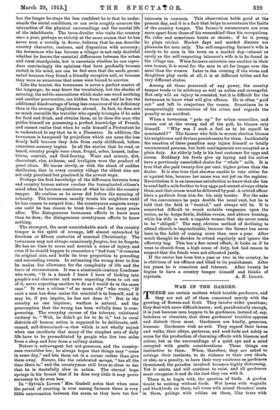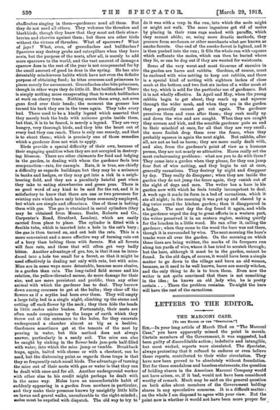WAR IN THE GARDEN. T HERE are certain matters which trouble
gardeners, and they are not all of them concerned merely with the growing of flowers and fruit. They involve wider questions; they deal with more difficult issues ; and, paradoxically enough, it is just because men happen to be gardeners, instead of, say, butchers or chemists, that these gardeners' troubles oppress and disturb them most. Gardeners are kindly, generous, humane. Gardeners wish no eviL They regard their lawns and walks, their alleys, parterres, and seed-beds not solely as areas for the production of charming effects with blossom and colour, but as the surroundings of a quiet eye and a mind occupied with gentle considerations. These things are instinctive to them. When, therefore, they are asked to outrage their instincts, to do violence to their own ideals, or else, as a penalty, to have their very existence as gardeners threatened, the paradox involved becomes highly distressing. Yet it exists, and will continue to exist, and all gardeners must recognize it and do the best they can with it.
There is, to begin with, the question of birds. A garden would be nothing without birds. Wet lawns with wagtails and blackbirds on them, tall trees with missel thrushes' nests in them, palings with robins on them, lilac trees with
chaffinches singing in them—gardeners need all these. But they do not need all others. They welcome the thrushes and blackbirds, though they know that they must net their straw- berries and cherries against them ; but there are other birds without the virtues of thrushes. What of sparrows P What of jays ? What, even, of greenfinches and bullfinches ?
Sparrows may destroy grubs and caterpillars when they have nests, but the purpose of the nests, after all, is merely to add more sparrows to the world, and the vast amount of damage a sparrow does in the rest of the year is not compensated for by the small amount of good he does in the spring. He has also detestably mischievous habits which have not even the definite purpose of obtaining food ; he bites crocuses and primroses to pieces merely for amusement. Greenfinches also bite primroses, though in other ways they do little ill. But bullfinches P There is simply nothing more exasperating than to watch bullfinches at work on cherry trees. Nothing scares them away, not even guns fired over their beads; the moment the gunner has turned his back they are in the trees again. They take every bud. There used to be a kindly legend which asserted that they merely took the buds with noisome grubs inside them, but that, it is to be feared, is merely a legend. They are very hungry, very thorough birds, and they bite the heart out of every bud they can reach. There is only one remedy, and that is to shoot them; which is precisely one of those remedies which a gardener does not wish to apply.
Birds provide a special difficulty of their own, because of their engaging qualities when they are not occupied in destroy- ing blossom. There are other claimants for food and lodging in the garden, in dealing with whom the gardener feels less compunction—rats, for example. Rats, it is true, are chiefly a difficulty as regards buildings; but they may be a nuisance in banks and hedges, or they may get into a rick in a neigh- bouring field, and they are a peculiarly hateful pest when they take to eating strawberries and green peas. There is no good word of any kind to be said for the rat, and it is satisfactory to know that there are one or two processes for evicting rats which have only lately been commonly employed, but which are simple and efficacious. One of these is bolting them with gas. The gas is contained in metal cylinders (they may be obtained from Messrs. Boake, Roberta and (Jo., Carpenter's Road, Stratford, London), which are easily carried from place to place. The cylinder is fitted with a flexible tube, which is inserted into a hole in the rat's bury ; the gas is then turned on, and out bolt the rats. This is a more convenient and a more effective way of turning rats out of a bury than bolting them with ferrets. Not all ferrets will face rats, and those that will often get very badly bitten. Another advantage of gas, too, is that it can be intro- duced into a hole too small for a ferret, so that it might be used effectively in dealing not only with rats, but with mice. Mice are in some ways more detestable, because more elusive, in a garden than rats. The long-tailed field mouse and his relation, the yellow-throated mouse, do more damage for their size, and are more persistent and prolific, than any other animal with which the gardener has to deal. They burrow down among crocuses to get at the bulbs ; they clear off the flowers as if a scythe had been over them. They will empty a large tulip bed in a single night, climbing up the stems and cutting off each flower by the neck ; they then hide the beads in little caches under bushes. Fortunately, their nests are often made conspicuous by the heaps of earth which they throw out at the entrances to the holes, for they excavate underground a chamber almost as big as a beehive.
Gardeners sometimes get at the tenants of the nest by pouring in water, but this method does not always answer, particularly in a sandy soil. The mice can also be caught by sinking in the flower-beds jam-pots half-filled with water, into which the mice jump or tumble. Breakback traps, again, baited with cheese or with a chestnut, can be used, but the distressing point as regards these traps is that they so frequently catch small birds. The advantage of turning the mice out of their nests with gas or water is that they can be dealt with once and for all. Another underground worker with other sins to his credit might perhaps be dealt with in the same way. Moles have an uncomfortable habit of suddenly appearing in a garden from nowhere in particular, and they make their presence known by unsightly little hills on lawns and gravel walks, unendurable to the right-minded ; moles must be expelled with dispatch. The old way to try to do it was with a trap in the run, into which the mole might or might not walk. The more ingenious get rid of moles by placing in their runs rags soaked with paraffin, which they cannot abide; or, using more drastic methods, they procure from seedstnen or other merchants what are known as smoke-ferrets. One end of the smoke-ferret is lighted, and it is then pushed into the run; it fills the whole run with vapours which suffocate the moles, which can then be buried where they lie, or can be dug out if they are wanted for waistcoats.
Some of the very worst and most tiresome of enemies in the garden are hares and rabbits. Gardens, of course, must be enclosed with wire netting to keep out rabbits, and there is a special kind of netting with eighteen inches of close mesh at the bottom and two feet six inches of a wider mesh at the top, which is sold for the particular use of gardeners. But it is not wholly effective. In April and May, when the young rabbits begin to get about, they reach up and squeeze through the wider mesh, and when they are in the garden they generally cannot get out again. The gardener perceives them and runs after them; they rush madly up and down the wire and are caught. When they are caught they scream and kick, and the sensible gardener puts an end to their mischief at once, for all that they are very small; the more foolish drop them over the fence, when they probably squeeze in again the next night. But rabbits, after all, are not as bad as hares; they are more easily dealt with, and also, from the gardener's point of view as a humane person, they are not nearly so attractive. Hares really set the most embarrassing problems: what are you to do with them? They come into a garden when they please, for they can jump four feet of wire netting, and they begin to eat at once, generally carnations. They destroy by night and disappear by day. They really do disappear; when they are inside the garden they do not jump the fence again, they vanish out of the sight of dogs and men. The writer has a hare in his garden now with which he feels totally incompetent to deal. A week ago it made its form in a bed of carnations, which it ate all night; in the morning it was put up and chased by a dog twice round the kitchen garden; then it disappeared in a hedge. The next day the dog found it again, and while the gardener urged the dog to great efforts in a western part, the writer perceived it in an eastern region, making quietly for the bracken in a little wood. He ran after it, calling the gardener ; when they came to the wood the hare was not there, though it is surrounded by wire. The next morning the hare's tracks were all over the garden. On the morning on which these lines are being written, the marks of its forepaws run along ten yards of wire, where it has tried to scratch through; but the hare, although it must be in the garden, cannot be found. In the old days, of course, it would have been a simple matter to go down to the village and burn an old woman, because, as it used to be well known, hares are merely witches, and the only thing to do is to burn them. Even now the writer is not quite convinced that there is not something in the idea ; he knows an old lady who, he is pretty certain. . . There the problem remains. To-night the hare will have the rest of the carnations.











































 Previous page
Previous page